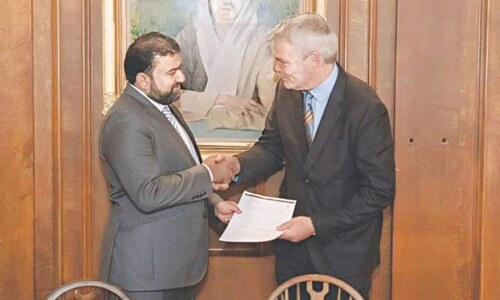KABUL: A group of Afghan women protested in Kabul on Saturday, defying a crackdown on dissent to urge foreign nations not to formally recognise the Taliban government, ahead of a UN summit next week.
Protesters opposing creeping curbs on women’s rights have been beaten or detained since the Taliban surged back to power in 2021, and security forces have fired into the air to disperse some rallies. However, small groups of women have continued to stage sporadic gatherings.
Around 25 women marched through a residential area in the Afghan capital on Saturday, ahead of a summit in Doha that the United Nations says will discuss a “durable way forward” for the country.
“Recognition of Taliban — violation of women’s rights,” the women chanted during the march, which lasted no longer than 10 minutes and passed without confrontation with security forces.
Two-day Doha moot to find a durable way forward on Afghanistan begins tomorrow
Other chants included “Afghan people, hostages of Taliban” and “We will fight, we will die, we will take our rights”.
No nation has yet acknowledged the government as legitimate since the Taliban returned to power after US forces withdrew from Afghanistan in 2021.
A previous Taliban government that ruled from 1996 to 2001 was granted formal recognition by three nations — Saudi Arabia, Pakistan and the United Arab Emirates.
Diplomats, NGOs and aid agencies are deeply divided over the issue. Some believe the international community might cajole Taliban authorities into reversing curbs on women’s rights by dangling the prospect of recognition.
Others say even discussing it grants the Taliban government some legitimacy at a time when they are squeezing women out of public life.
UN Deputy Secretary-General Amina Mohammed said last week the Doha meeting starting on Monday could see envoys discuss “baby steps” on a path to recognition, albeit with conditions. “There are some who believe this can never happen. There are others that say, well, it has to happen,” Mohammed said in a talk at Princeton University. “The Taliban clearly want recognition... and that’s the leverage we have.”
However, the United Nations has announced that the “de facto authorities” of Afghanistan have not been invited to the Doha conference. “Recognition is not an issue,” a spokesman for the world body said.
The gathering in Qatar on Monday and Tuesday is instead intended to focus on reinvigorating “the international engagement around common objectives for a durable way forward on ... Afghanistan,” the spokesman added.
Shamail Tawana Nasiri, a 26-year-old protester, said any discussion of formal recognition “will give the Taliban motivation”. She said for those who were oppressed and whose rights taken away, it increased their concerns.
The UN will also provide an update on aid operations, which have been hampered by a Taliban government order barring Afghan women from working for the world body, at Monday’s meeting.
It has said it faces an ‘appalling choice’ over whether to maintain its huge operation in the country of 38 million people.
In December, the 193-member UN General Assembly approved postponing, for the second time, a decision on whether to recognise the Afghan Taliban administration by allowing them to send a United Nations ambassador to New York.
The UN Security Council unanimously condemned earlier this week a Taliban administration ban on Afghan women working for the United Nations in Afghanistan and called on Taliban leaders to ‘swiftly reverse’ a crackdown on the rights of women and girls.
The Taliban says it respects women’s rights in accordance with its strict interpretation of Islamic law. Taliban officials said decisions on female aid workers were an ‘internal issue’.
Published in Dawn, April 30th, 2023













































Dear visitor, the comments section is undergoing an overhaul and will return soon.